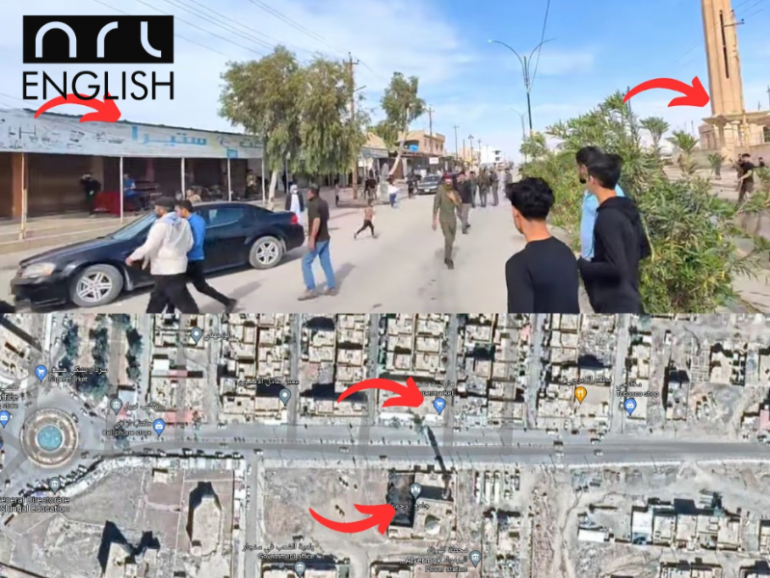In Sinjar, a predominantly Yazidi town, an incident at a mosque has escalated ethnic tensions between Yazidis and Arabs. The tensions were fueled by circulating images of past damage to mosques, which has led to controversy and misinformation.
Following a meticulous examination of video and photo materials, as well as monitoring various official statements, we present a detailed account of the incidents that took place in Sinjar on Thursday, April 27.
The Ezidi Press media outlet reported “violent protests” occurring in Sinjar as approximately two dozen Sunni Arab families returned to the town from displacement camps. The protests were ignited by one Yazidi woman, a survivor of Islamic State (IS) atrocities, who claimed to have identified one of the returning Arabs as an IS militant who raped her in 2014. IS’s heinous acts against the Yazidi community have been recognized as genocide by more than a dozen countries worldwide.
Subsequently, local security forces arrested the accused individual. A video that gained considerable traction online depicted around two dozen people, believed to be Yazidis, protesting near a mosque, with some hurling stones at its wall. One person is seen kicking the gate.

The footage also showed a fire burning in the street outside the mosque’s perimeter. But not, crucially, within the mosque itself.

Soon after, rumors began circulating that a mosque in Sinjar had been set ablaze. In response, the KRG Ministry of Endowments and Religious Affairs released a statement condemning the alleged attack on the mosque, characterizing it as a hostile act that contravenes the principles of religious tolerance and the peaceful coexistence upheld by Kurdish traditions. Islamic political parties in the Kurdistan Region echoed this condemnation.
An image of the same mosque taken at an earlier date also circulated online (including ostensibly credible news outlets), falsely purporting to depict recent interior damage (for example here, here, here, here, and here).

The photo, captured on April 14, was originally shared by Ismail Muhammad Saleh, the Director of the Sunni Endowment in Sinjar, who posted it on Facebook to announce the commencement of the Al-Rahman Mosque’s restoration process.
An examination of the video taken outside the mosque reveals “Steer Market” situated across from the Al-Rahman Mosque. Both of these locations can be easily located and pinpointed on Google Maps and Apple Maps, as they are directly opposite each other.

In the video, what appear to be two large white LPG tanker trailers can be seen beside the mosque. Two trees stand across the street. Additionally, a traffic island with some trees is visible. These features have all identified and marked all of these elements on the map.

Nazir Shingali, NRT Kurdish correspondent in Sinjar, verified the authenticity of the protest video but refuted allegations that the protesters had entered or set fire to the mosque.
On Friday, April 28, Hazem Tahsin Bey, the Emir of the Yazidis in Iraq, issued a statement reaffirming his rejection of the alleged attack and burning of the “Al-Rahman Mosque,” stressing that such actions contradict Yazidi morals. Tahsin Bey also expressed gratitude for the support Muslims extended to Yazidis during the IS invasion of Sinjar and their subsequent persecution.
The Yazidi Supreme Spiritual Council firmly denied any attacks on the Al-Rahman Mosque in Sinjar district, Nineveh province on Thursday but emphasized its rejection of the return of certain Sunni Arab families who collaborated with and joined the Islamic State (IS) in 2014, perpetrating horrific acts against religious minorities.
Counselor of the Yazidi Supreme Spiritual Council, Karim Suleiman, stated in a press conference that an investigation into the Sinjar incident revealed no assault on the Al-Rahman Mosque. He also mentioned that the Yazidi Emir sent a three-person committee to Sinjar, which is Şingal in Kurdish, to inspect the mosque closely. The committee found that the mosque had neither been attacked nor burned.
Suleiman stressed that Yazidis of Kurdistan, like all other groups, support unity, brotherhood, and solidarity that exist in this country, and “attacking mosques is not in the way of Yazidis.”
Yesterday, Mam Fakher, a Yazidi cleric, published a video inside the Al-Rahman Mosque, rejecting any attacks or burns inside the mosque and urging an end to rumors and incitement against Sinjar and the Yazidis.



